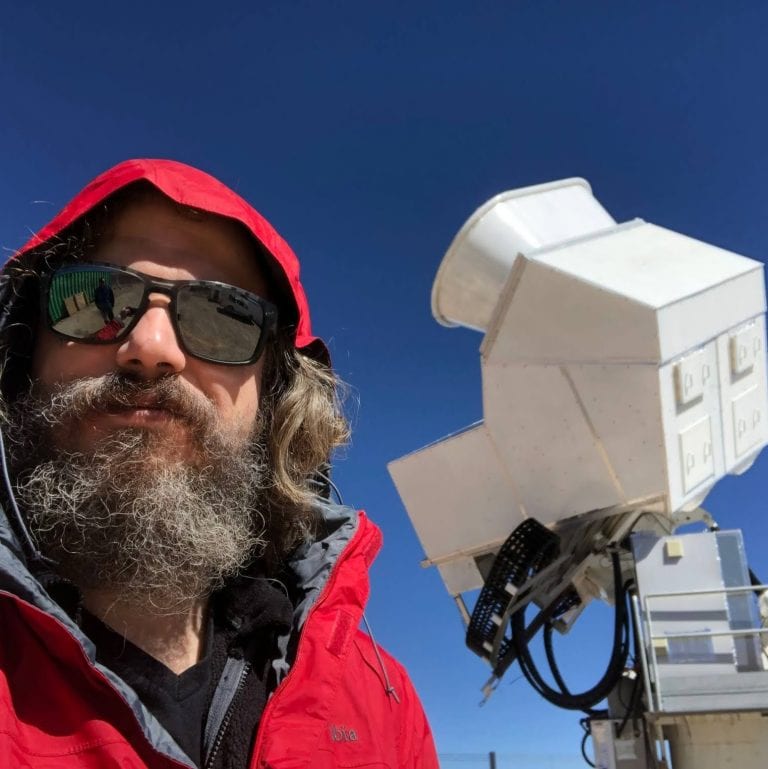About Dr. Tobias MarriageFor some background, I have attached Dr. Marriage's biography from the Johns Hopkins website. "Tobias Marriage’s research interests lie in cosmology and astrophysics with an emphasis on the cosmic microwave background (CMB). His research activities include millimeter-wave instrumentation, fieldwork, and analysis. Marriage played a major part in building the Atacama Cosmology Telescope (ACT), a mm-wave telescope 5,000 meters above sea level in Chile that studies fine angular-scale structure in the CMB. He and his group continue to work with ACT data and other datasets to study galaxies and galaxy clusters. Marriage is now a Co-PI of the Cosmology Large Angular Scale Surveyor (CLASS) project. CLASS is an array of telescopes designed to measure the CMB polarization on the largest angular scales over a broad range of frequencies. The primary goal of CLASS is to detect and characterize the expected gravitational waves from inflation via the induced B-mode polarization pattern in the CMB. CLASS also measures when the first stars formed (by constraining the optical depth to reionization) and searches for large angular scale polarization anomalies that could provide new insights beyond the current cosmological paradigm." I have also attached his Curriculum Vitae below.
The InterviewQ: Where do you see the future of astrophysics research going?
I see the near future playing out along the same lines as the last two decades. Powerful ground-based (e.g., 30 m class) and space-based telescopes (e.g., the James Webb Space Telescope) will enable astronomers, from individuals to medium-sized teams, to reveal the character of our universe. In the last twenty years, we have also witnessed the rise of mega-teams ("collaborations") that come together to make definitive measurements ("surveys") of large parts of the universe. The poster child of the next generation of these is going to be carried out over the whole southern sky by the Large Synoptic Survey Telescope. Though major surveys are also planned or taking place across the electromagnetic spectrum. Q: What do you find most exciting about the research that is being done right now in the field of astrophysics (including your own work with CLASS)? For me, the most profound questions center on understanding how the universe as a whole came to be the way it is. This has two parts: (1) making measurements back to the earliest times and then (2) using physics to understand what we see. For me, the most exciting part of this enterprise is when the physics with which we're familiar cannot explain the measurements. This has happened with dark matter and dark energy. These two effects govern the universe today, and we while we have a good mathematical parametrization for them, we don't know what they are from basic physical principles. These two things are probably the most significant mysteries facing physics and astronomy today. Q: What would you say is the frontier of astrophysics? (i.e. What are some of the major unknowns that astrophysicists are trying to solve?) Astrophysics is a broad discipline, and there are many frontiers. In cosmology, as I said, we don't know what dark matter is, and we don't understand why the expansion of the universe is accelerating (that's dark energy). The other major cosmological frontier is at the very beginning of the universe -- trying to understand what set the initial conditions from which the stars, galaxies, and, eventually, us grew. Right now the most successful theory of this is called inflation, which posits that everything in the universe grew from microscopic quantum fluctuations that were inflated to cosmological sizes. Sounds crazy but it works. Outside of cosmology, a major, relatively new, frontier is the study of exoplanets -- planets outside of our solar system. The holy grail here is to find an earth-like planet. Of course the newest frontier is gravitational wave astronomy with LIGO, VIRGO, etc. That is just getting started, and it will be exciting to see what more we learn from these measurements. Q: What advice would you give to a high school student with a keen interest in astrophysics and cosmology, like myself? In high school, of course you should take key science classes, like physics, chemistry, biology. But also learn how to read and write very well. This is harder than it sounds. I would recommend seeking out research at the university level early, starting second semester freshman year. (Take the first semester to settle in and get your feet on the ground.) Research tends to be focused on a particular problem, so you'll want to use your own reading and coursework to broaden your purview to be informed for your next steps. This includes taking the humanities seriously. I recommend being wary of having two concentrations (majors) unless you really want to do both. While having multiple degrees sounds attractive, it can be more rewarding to have one concentration (such as physics or astronomy) and then explore broadly and take the best classes in different departments. (This is what I wish I had done!) Thank you so much to Dr. Marriage for making this interview possible, providing such great responses, and being so kind throughout the process. It is greatly appreciated!
1 Comment
|
Categories |
||||||||

